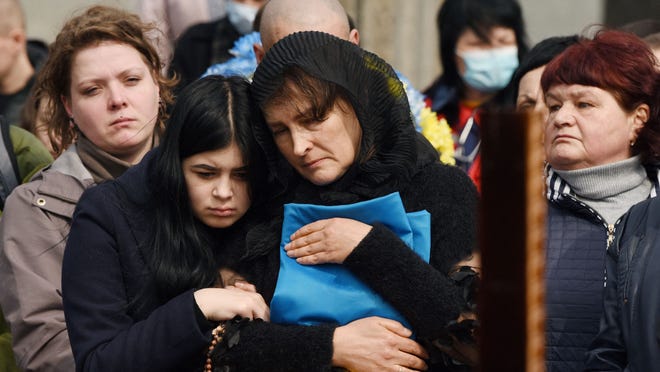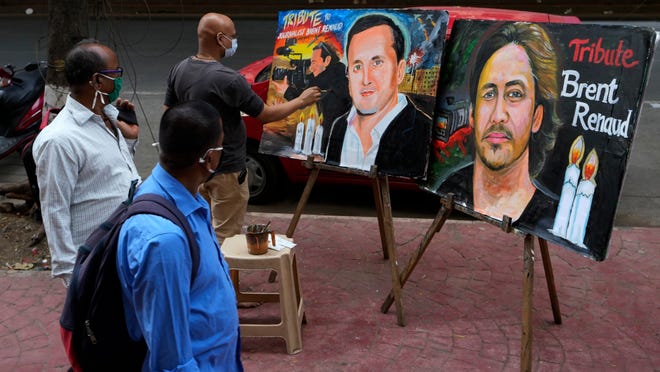The Russian military said Tuesday that it had “drastically” reduced its military activity near the Ukraine capital of Kyiv and the northern city of Chernihiv as talks with Ukraine aimed at ending the war entered the “practical” stage.
Russia and Ukraine began face-to-face talks Tuesday in Turkey as the United Nations pressed for a cease-fire for Russia’s brutal invasion. The talks took place in the Turkish presidential office in Istanbul and lasted more than three hours, Russia’s Tass reported.
Alexander Fomin, Russia’s deputy minister of defense, said the military cutbacks were made to “increase mutual trust and create conditions for further negotiations.”
Ukraine’s military said it had detected withdrawals around Kyiv and Chernihiv; the Pentagon said it could not confirm the reports. The Russian advance on Kyiv had stalled in recent weeks, but missile strikes have battered the city and left shortages of food, water and other necessities for a population of almost 3 million people.
LATEST MOVEMENTS:Mapping and tracking Russia’s invasion of Ukraine
STRAIGHT TO YOU:The latest updates on the situation in Ukraine. Sign up here.
The head of the Ukrainian delegation, David Arahamiya, said his side presented an official proposal for a new system of security guarantees. The proposed security pledge will not apply to the parts of Ukraine whose status remains in dispute – Crimea, which Russia considers its territory, and the breakaway Donetsk and Lugansk People’s Republics
“We insist that it be an international treaty signed by all security guarantors who ratify,” he said. “We want it to be an international mechanism of concrete security guarantees for Ukraine.”
Ahead of the talks, Ukrainian President Volodymyr Zelenskyy said his country was prepared to declare its neutrality, as Moscow has demanded, and was open to compromise over the contested eastern region of Donbas – comments that might lend momentum to negotiations.
Turkish President Recep Tayyip Erdogan said the warring nations had a “historic responsibility” to stop the fighting.
“We believe that there will be no losers in a just peace,” Erdogan said as the talks began in Istanbul. “Prolonging the conflict is not in anyone’s interest.”
Latest developments
► President Biden convened a call Tuesday with European leaders including Emmanuel Macron of France, Olaf Scholz of Germany, Mario Draghi of Italy and Boris Johnson of the United Kingdom to discuss the latest developments regarding Russia’s invasion of Ukraine, the White House said.
► Information technology companies are focused on providing reliable information and stymying Russian propaganda about the invasion, Google CEO Sundar Pichai said in Warsaw for a meeting with Poland Prime Minister Mateusz Morawiecki.
► Russian Defense Minister Sergei Shoigu on Tuesday joined other top Russian officials in saying that “liberating Donbas” was Moscow’s main military goal. That would ease concerns that Russia plans on seizing the entire country but adds to fears Russia plans to split southeastern Ukraine from the rest of the country.
► Russia has destroyed more than 60 religious buildings across the country in just over a month of war. Most of the damage is concentrated near Kyiv and in the east, Ukraine’s military said Tuesday.
► Seven people were killed when a Russian missile slammed into a nine-story government building in Mykolayiv, Ukrainian President Volodymyr Zelenskyy said Tuesday. He said 22 people were wounded.
US troop presence in Europe almost doubles, to 100,000
U.S. troop presence in Europe has swelled from 60,000 to about 100,000 as a result of Russia’s invasion of Ukraine, Gen. Tod Wolters, commander of the U.S. European Command and Supreme Allied Commander Europe of NATO, told the Senate Armed Services committee on Tuesday.
“Russia’s premeditated and unprovoked invasion of Ukraine has galvanized our allies and global partners,” he told the committee. “NATO’s capabilities in space and cyberspace are more closely integrated than in any other time in the Alliance’s history.”
Wolters said the U.S. is supplying Ukraine with military equipment as meets their military campaign’s supply and demand “to ensure they’re getting the right equipment at the right time … so they can best protect their forces.”
Asked why Russia would’ve used hypersonic weapons in Ukraine, Wolters said it was likely done “to put fear in the hearts of the enemy, and I don’t think they were successful.” He added that most of those strikes were aimed at military targets.
– Katie Wadington
Russia: Putin, Zelenskyy could meet before final deal struck
Russia’s chief negotiator Vladimir Medinsky said the first day of negotiations between Ukraine and Russia was “constructive.” He said a meeting between Russian President Vladimir Putin and Ukrainian President Volodymyr Zelenskyy could take place as soon as the parameters of a peace deal were in place. Zelenskyy has been pressing for a meeting with Putin for weeks, but Russian negotiators had insisted the deal must first be completed.
Ukraine’s defensive strategy could add to peril facing civilians
Ukraine’s defense against Russian attacks could be increasing the risk to civilians in the war-torn nation, experts tell The Washington Post. Most neighborhoods in Ukraine’s cities have become “militarized,” making them potential targets for Russian forces, the Post says. Russia has been pounding some cities, and Ukrainians have responded by deploying air defense systems, heavy weaponry, soldiers and volunteers to residential areas. All are rich targets for Russian missiles.
“I am very reluctant to suggest that Ukraine is responsible for civilian casualties because Ukraine is fighting to defend its country from an aggressor,” William Schabas, an international law professor at Middlesex University in London, told the Post. “But to the extent that Ukraine brings the battlefield to the civilian neighborhoods, it increases the danger to civilians.”
Ukraine takes back towns
Ukrainian forces were continuing their efforts to reclaim territory swept up in the Russian offensive. The Ukraine military retook Irpin, northwest of Kyiv, from Russian troops, who were regrouping to take the area back, President Volodymyr Zelenskyy said late Monday as he sought to rally the country. Ukrainian forces also seized back control of Trostyanets, south of Sumy in the northeast, after weeks of Russian occupation.
“We still have to fight, we have to endure,” Zelenskyy said in his nighttime video address to the nation. “We can’t express our emotions now. We can’t raise expectations, simply so that we don’t burn out.”
The Ukrainian government said it was operating three humanitarian corridors Tuesday to move civilians out of the besieged port of Mariupol and two Russian-occupied cities in the south.

Cyberattack hits Ukraine’s national telecommunications provider
A “massive” cyberattack knocked Ukraine’s national telecommunications provider Ukrtelecom almost completely offline Monday morning, and outages persisted into the evening. Network monitors said it was the most severe outage since Russia invaded Ukraine over a month ago. Most Ukrainian customers were cut off from service so Ukraine’s military could continue using it, the chair of Ukraine’s state service for special communication, Yurii Shchyhol, said.
Shchyhol blamed “the enemy” for the cyberattack, refraining from specifically naming Russia.
– Celina Tebor
Many in Middle East see hypocrisy in Western embrace of Ukraine
Within days of the Russian invasion, Western countries invoked international law, imposed crippling sanctions, began welcoming refugees with open arms and cheered on Ukraine’s armed resistance. The response has elicited outrage across the Middle East, where many see a glaring double standard in how the West responds to international conflicts.
“We have seen every means we were told could not be activated for over 70 years deployed in less than seven days,” Palestinian Foreign Minister Riad Malki told a security forum in Turkey earlier this month.
“Amazing hypocrisy,” he said.
The Biden administration said Wednesday that the United States has assessed that Russian forces committed war crimes in Ukraine and would work with others to prosecute offenders. But the U.S. is not a member of the International Criminal Court and staunchly opposes any international probe of its own conduct or of its ally, Israel.
Contributing: The Associated Press




